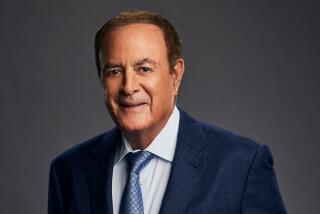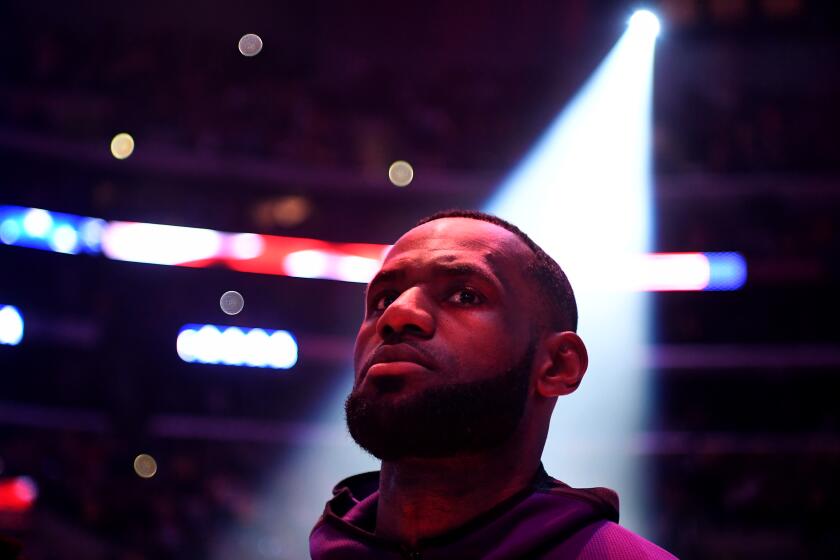Idol Thoughts : TBS SERIES ANALYZES THIS CENTURY THROUGH ITS ATHLETIC HEROES
- Share via
“Idols of the Game,” a new six-hour special premiering this week on TBS, is more than a sports documentary--it’s an examination of American history this century.
“I’m a sportswriter and I have always been interested in history and the connection to larger culture,” says New York Times reporter Robert Lipstye, who created and penned the documentary. (His wife Kathy Sulkes is the series producer.) “The most interesting way to tell the history of the century through sports was through sports figures rather than through issues or sports.”
Says Jacoba Atlas, supervising producer for Turner Original Productions, “I think a lot of things done on sports is just hero worship. Put in a social context, ‘Idols’ is really trying to say something about this century using sports as a vehicle for it. It is about who we are as a country and Americans as seen through the eyes of sports figures. It is not about wins and losses. I think it really does resonate for people who don’t necessarily care about sports.”
The documentary is divided into three parts. Monday’s “Inventing the All-American” examines such sports legends as Jim Thorpe, Babe Ruth, Joe Louis, Jackie Robinson, Arnold Palmer and Muhammad Ali.
Tuesday’s “Babes in Boyland” explores the differences in the sexes in the world of sports and profiles all-around athlete Babe Didrikson, tennis champions Billie Jean King and Chris Evert, boxer John L. Sullivan, Mickey Mantle and Joe Namath.
Thursday’s “Love and Money” looks at the battle of values in sports. Shoeless Joe Jackson, Charles Barkley, Michael Jordan, Knute Rockne and Mary Lou Retton are featured.
Dabney Coleman, who portrayed a sportswriter on the ABC comedy series “The ‘Slap’ Maxwell Story,” is the host and narrator of the series. He plays “the Scribe,” a fictional, ageless sportswriter who has seen--and written about--it all.
“Turner wasn’t going to put me on the air,” Lipstye says, laughing. “I did want somebody to be a consistent voice who would be my voice and that’s why the Scribe. I really kind of struggled with that one, but I loved the idea of a fictional character in a documentary. I think [Coleman] was wonderful.”
“The Scribe,” Atlas adds, “seems so intrinsic to the story because it’s really Bob’s voice. This more than any other documentary has such a strong point of view. It’s not an overview. It’s very much Bob’s personality.”
Lipstye created a standard for choosing which athletes to be profiled: They all had to be major crossover figures. “My favorite from my kidhood was Joe DiMaggio,” he says. But, “there was no way he could make the cut. The idea being he really didn’t become any kind of a cultural icon until after baseball when he married Marilyn Monroe. Mickey Mantle, on the other hand, so quickly became a symbol, particularly a male symbol. Arnold Palmer is another example, but he has been totally overwhelmed by other golfers. Jack Nicklaus is a far, far better golfer, but certainly he has had none of the same cultural impact” as Palmer.
The same with Namath, the shaggy-haired New York Jets quarterback of the mid-’60s and early ‘70s with the playboy image. His impact on culture and the sport, Lipstye says, “was amazing. And then to find out how innocent he was about what he was doing. He was a true symbol, but he didn’t know what it was about. He was clueless. He was really demonized at the time that he would turn the youth of America against their authority figures. I never knew an athlete who was nicer to his mother and to his father.”
Several of the sports figures profiled participated in the documentary. “Idols” features one of the last interviews with Mantle, the New York Yankees great, before his death from cancer last summer. “He was interviewed between the time he got out of Betty Ford and when he began to look for a liver,” Lipsyte says.
Some figures played hardball. The producer who tracked down Jordan and Barkley, Lipstye says, “did herculean work. He really had to stalk them. They were really hard to settle down. Some never really talked to us.”
Like Palmer. “I suspect that at the time he was trying to [start] up the Golf Channel and he was holding everything for himself,” Lipstye says. “I have interviewed him both in print and TV over the years and he is very circumspect. He never gives anything away.”
Chris Evert’s interview took Lipsyte by surprise. “I had just forgotten how smart Chris Evert is and the perspective she has. She is wonderful.”
“Idols of the Game” also features interviews with the families, friends and peers of the sports figures.
“We wanted to get real people as much as possible,” Lipstye says. “I think pretty much, expect for Peter Levine, the historian, we didn’t have too many [talking] heads as such. Those people were great. Jim Thorpe’s son. He knocked me out. I felt he was kind of wonderful. The people chattering about Babe Didrikson. They had every mixed feelings about her. I mean she was crude and she was awful and she was greedy and she kept everything for herself, but she made their sports life possible.”
“Idols of the Game” airs Monday, Tuesday and Thursday at 5:05 and 7:05 p.m. on TBS; all three parts will repeat Saturday at 9:05 a.m.
More to Read
Go beyond the scoreboard
Get the latest on L.A.'s teams in the daily Sports Report newsletter.
You may occasionally receive promotional content from the Los Angeles Times.











